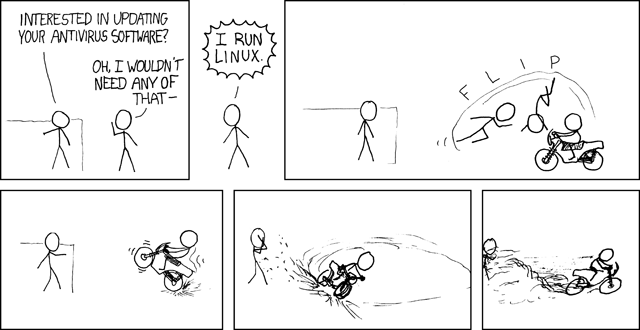the same with the apple statement of appleram being 2 times better than other ram because they copied a old version of one of the memory compression methods supported by Linux for years. Linux ram is even better.

Regardless of us using Linux on our home computers, most businesses and services use Windows machines. Your information is likely still stored on Windows machines elsewhere if you interact with the world at all.
With that in mind, it’s worth being aware of Windows security problems when they come up.
most servers actually also run linux, even microsoft(maker of windows) runs Linux on many of their servers. linux is just many times better in IO, ram , cpu, and networking. not only in compatibility and stability and security but also speed and latency. all those thigns matter to servers. that said many very small companies store things on a nas and then acces it with windows or mac computers. which can be very annoying if you work at such a place since then you have to use a unstable computer, which has almost no free ram or cpu and will chrash when it shouldn’t and you aren’t allowed to install Linux on it. but most of the internet runs Linux. actually GNU+Linux is by far the most used operatingsystem worldwide, not only pretty much all servers, and essentially all supercomputers run it, but android, and chrome os also are Linux, but they just run something like a box on it, and people only see the box instead of Linux. then many small devices also run it, and ofcource spacecrafts and such. in normal desktop use the score is much lower at around 2%, however that score is also affected a lot by how Linux users do not allow their os to be submitter automatically to some server, or that those are directly hosted by the developers who will not always share it with those public sources. next to that sites and such tracking what os people use are less likely to get the info from Linux users as they are much more likely to use security tools. steam might be seen as accurate as both on windows and Linux only select people use it, but then you only have that field of people, and then there was the bug where the steam hardware survey had a much smaller chance of triggering when running Linux(even though that might be fixed by now). based on stats for pc desktop use 1 in 50 people would use Linux on pc, however when looking at total use desktop is but a fraction from all computers worldwide.
I think the point of my comment is being missed a bit here friend. Servers and backend use Linux, sure. The actual number of Linux users is likely under reported as you say.
But I have yet to see Linux used as a workstation OS in a place of business. Every doctor, insurance broker, banker, registry, and retail place I’ve visited were using Windows machines to access their infrastructure. If Windows creates vulnerabilities at entry and exit points it can still compromise information.
Taking the internet into consideration, I would doubt “most”.
These YouTube channels not even aknowleging other operating systems than Windows like ThioJoe kinda annoy me
uh, you do know there are exploits in Linux right? Stop pretending that Linux is “virus free”
Absolutely nobody is saying that.
I mean… a form of Microsoft Defender is available for Linux, but only for enterprise customers if I remember correctly 😅
Yep, my company allows me to use Linux but for Compliance Reasons I need to have Microsoft Defender installed and running. Still beats Windows 11 by a mile
Sometimes Mint tells me there are security updates available. Happened just this morning. Updating makes me feel good :)
And it had the Edge of not installing Candy Crush
Is not having an anti-virus good for most people though?
most antivirus apps are very invasive, heavy on resources and even spy on you. Windows defender is usually enough. However, virustotal is still recommended
On one side, if you have a brain you’re fine.
On the other side, *glances at general public typing google.com into google* …yeah
If you think being on Linux makes you immune for attacks, I have bad news for you.
there are much less vulrenabilities on Linux. No system is totally unpenetrable, but having 2-5 vulrebabilities is always better than having 30-40
I’ve got a link for you to click, Mr super secure OS user. I promise your OS will protect you.
you are just exploiting my words. I never said Linux will protect me whatever happens. But it will have a better protection inherently, than any windows
You’re holding onto a long-standing misconception: Linux is not inherently more secure than Windows. In fact, the opposite can be true.
The reason Linux seems safer is because it has a much smaller market share. Attackers don’t build massive botnets to target misconfigured Linux systems the way they do for Windows. But that’s not security—that’s just security through obscurity, which doesn’t hold up if someone is targeting you specifically.
Let me clarify my earlier point about “a link for you to click.” If an attacker is specifically targeting someone using Linux, they’re not any better protected than someone on Windows. At that point, it comes down to how well the user understands and secures their system.
The key difference? Windows actively warns you about misconfigurations that open you up to attack. For example, try enabling Remote Desktop Protocol—Windows will warn you repeatedly about the risks. Linux, on the other hand, won’t stop you. You can misconfigure SSH, open ports, or skip updates without a single warning. If someone’s after you and you’ve made a mistake? You’re toast.
Linux is powerful, but it doesn’t hold your hand the way Windows does. If you think it’s inherently secure, you’re just relying on the fact that fewer bots are looking for you—not that the system itself is protecting you.
Linux can be configured to have much better security, even by someone knowing a little about computers due to its open-source nature. And it is especially true to my case, since i’m an IT student Can you change to a hardened kernel on Windows? I use Helios kernel even on my android, which is designed to be more secure than the stock one. And there are distros which come preconfigured for security. Not much skill is needed to have a secure Linux system. But you can be a highly proficient sysadmin on Windows, but you will still depend on a few thousand Microsoft employees to fix your system. On Linux, there are millions of people and various corporations are actively working to make it secure, and even you could, if you are really highly skilled. For someone who doesn’t know what a pendrive is, yes, Windows might be more secure than something like Ubuntu or any basic distro (and they propably can’t use anything more advanced and secure by design).
But it doesn’t take much skill to choose a highly secure linux distro, like Bazzite, Garuda, or even Qubes and use it, or maybe even harden your own. Android, which is also based on Linux is not secure by default, but in the hands of the right person, it can be a suprisingly secure system








